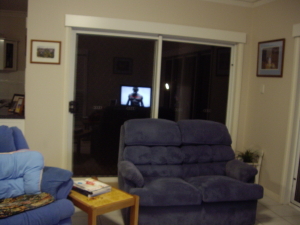Blog 25: The Man in the Mirror (Pt 3)
My very old Macquarie Encyclopaedic Dictionary (reprinted 1992), says that the verb to confuse means “to combine without order or clearness; to jumble; to render indistinct; or to fail to distinguish between.”
It would seem then that Bill, at this stage (mid 2010), could be classed as being “confused”. In the area of reflections, for example, he failed perpetually to distinguish between a real human being and his/her reflected image. You have seen, in the two former BLOGS, how this “failure to distinguish” affected us, how it stopped Bill, for example, from combing his hair and from using the toilet. By far, though, the greatest disruption that this loss of brainpower caused occurred at night.
Our family room, the room where Bill and I spent most of our time, is walled in by large glass doors, which reflect peoples’ images as they move around the room, or as their pictures pop up on the TV screen.
Our TV screen, reflected in the glass doors of our family room
Towards the end of May 2010, about a month after Bill came out of hospital, Bill started to see all these reflected images as real people. Though he kept his eye on them in the day, they didn’t worry him overly much. It was in the night, as I have said, that the trouble occurred. Waking each night at his usual time of 2am, he would go downstairs, as he always did, and turn on all the lights. But instead of bundling the newspapers or pushing the chairs around, he would stand behind his blue chair, hands on hips or holding on to the chair’s back, staring intently through the glass of one or both of the doors.
After a while, I would say to him:
“Do you think that you could come up to bed now?”
To which he would always reply:
“No! No! I have to look after this, and this, and this!” pointing to the lounge chairs and the coffee table and the TV.
I began to realise, as I watched night after night, that Bill was performing the task of Night-Time Security Guard and that he was making sure that all those reflections, that padded around our house all day and night, did not get in and steal any of our worldly wealth. At two o’clock in the morning, of course, he only had his refection and mine to be concerned about, but I’m sure that even they were worrying enough for him.
After an hour or so, Bill would become weary and would sit down in his blue chair and go to sleep. From that time on, after he awoke each night for his Security Guard Stint, he never went back up to bed again.
The pattern became:
8pm….. Up to bed
2am ….. Awake and downstairs
3am ….. Asleep in his chair
6am ….. Awake to meet the new day.
As time went on, it happened that I could not manage to get Bill up to bed at all. Eight o’clock would come, he would start to get drowsy and I would pat him on the hand, saying:
“Come on, love, it’s time to go to bed. Come on!”
Then, because there was next to no response, I would become more earnest, entreating:
“Don’t fall asleep! Don’t fall asleep. You’ve got to come up to bed.”
But it was all to no avail.
I never got Bill up to bed again.
He slept in that blue chair, feet planted firmly on the ground, ready to spring up and accost any reflection that might come through those doors, each and every night for almost the rest of his life.
And, as always happened when Bill’s brain determined that he should follow a certain path of behaviour, I soon modified my behaviour to accommodate his and began sleeping in the study downstairs, where I could “watch” him as we slept.
I have heard it said that the life-long personality traits of a dementia sufferer often become more pronounced as dementia takes its hold. This was certainly the case with Bill. He had always been the one to lock up the house at night, to walk around and check things through the day and to take responsibility for the family’s security in general. It was no surprise then that he took, so seriously, his job of keeping those reflections at bay.


Charmaine Zuidam
Waiting for your next blog…
Fay
It’s on its way, Charmaine, and thank you so much for continuing to follow and for continuing to comment.
Harold and Nola
Dear Fay,
This is the epitome of the caring man. It’s wonderful that, through all the negativity that must come out at such a time, this truly positive side of a person’s personality makes its way out. But how hard a row you were expected to hoe, and one wonders, in such a situation, what singular trait else would come out in each one of us? It truly makes one think.
Harold and Nola.
Fay
At the time, I didn’t see it as a positive thing. It was a pain-in-the-neck pest to have to get up every morning at 2am to keep an eye on Bill. But you are right …. it was that trait of “caring and protecting” that Bill had always had that was coming to the fore at that time …… exaggerated and skewed because of his inability to see a reflection for what it was …. but, nonetheless, a positive and admirable trait.
On another matter, I’ve bought that book that you recommended, Nola ….. “The Notebook”. I’m looking forward to reading it.